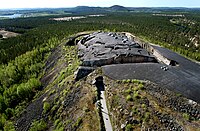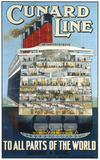Portal:Sweden/Selected article
Appearance
| This page is currently inactive and is retained for historical reference. Either the page is no longer relevant or consensus on its purpose has become unclear. To revive discussion, seek broader input via a forum such as the village pump. |
Usage
The layout design for these subpages is at Portal:Sweden/Selected article/Layout.
- Add a new selected article to the next available subpage.
- Update
"max="to new total for its{{Random portal component}}on the main page.
Selected articles list
Selected article 1
Portal:Sweden/Selected article/1
The naval Battle of Svolder (Svold, Swold) was fought in September 999 or 1000 somewhere in the western Baltic between King Olaf Tryggvason of Norway and an alliance of his enemies. The backdrop of the battle is the unification of Norway into a single state, long-standing Danish efforts to gain control of the country, and the spread of Christianity in Scandinavia. In later centuries, the saga descriptions of the battle, especially that in Snorri Sturluson's Heimskringla, have inspired a number of ballads and other works of literature.Selected article 2
Portal:Sweden/Selected article/2
Boden Fortress (Swedish: Bodens fästning) is a modern fortress consisting of several major and minor forts and fortifications surrounding the city of Boden, Norrbotten, in northern Sweden. Although the main forts were finished in 1908, many of the supporting fortifications were not completed until the start of the First World War. Improvements were also continuously made during, and between, both World Wars. The fortress was originally intended to stop or delay attacks from the east or coastal assaults, which at the time of construction meant Russian attacks launched from Finland. It was primarily the expansion of the railway net in Norrland, which in turn was a consequence of the rising importance of the northern iron ore fields, that led to the increased strategic value of northern Sweden and the construction of the fortress.Selected article 3
Portal:Sweden/Selected article/3
IFK Göteborg is a Swedish professional football club based in Gothenburg. The club is often referred to simply as IFK, although this can be confusing as there are many other clubs in Sweden who use the abbreviation as part of their name. IFK Göteborg, formed on 4 October 1904, have won 18 national championship titles, five national cup titles, and two UEFA Cups. With Malmö FF and AIK, IFK Göteborg are often considered part of the "Big Three" in Swedish club football, who have 43 championship titles between them. IFK is arguably the most successful club in Sweden, and perhaps in Scandinavia, as it is the only Scandinavian team to have won a pan-European competition.Selected article 4
Portal:Sweden/Selected article/4
Melodifestivalen (/mɛlʊˈdiːfɛstɪˌvɑːlɛn/; English: "The Melody Festival") is an annual music competition organised by Swedish public broadcasters Sveriges Television (SVT) and Sveriges Radio (SR). It determines the country's representative for the Eurovision Song Contest, and has been staged almost every year since 1959. Since 2000, the competition has been the most popular television programme in Sweden; it is also broadcast on radio and the Internet. In 2007, the semifinals averaged 3.1 million viewers, and an estimated four million Swedes watched the final. The festival has produced four Eurovision winners and sixteen top-five placings for Sweden at the contest.Selected article 5
Portal:Sweden/Selected article/5
S. A. Andrée's Arctic balloon expedition of 1897 was an ill-fated effort to reach the North Pole in which all three expedition members perished. S. A. Andrée (1854–97), the first Swedish balloonist, proposed a voyage by hydrogen balloon from Svalbard to either Russia or Canada, which was to pass, with luck, straight over the North Pole on the way. The scheme was received with patriotic enthusiasm in Sweden, a northern nation that had fallen behind in the race for the North Pole.Selected article 6
Portal:Sweden/Selected article/6
The allotment system (Swedish: indelningsverket; Finnish: ruotujakolaitos) was a system used in Sweden for keeping a trained army at all times. This system came into use in around 1640, and was replaced in the early 1900s by the Swedish Armed Forces conscription system. Two different allotment systems have been in use in Sweden; they are the old allotment system (äldre indelningsverket) and the new allotment system (yngre indelningsverket), the latter often referred to as just "the allotment system". The soldiers who were part of these systems were known as "tenement soldiers" (indelta soldater, the Swedish term, does not have the same meaning) due to the small tenements or crofts allotted to them.Selected article 7
Portal:Sweden/Selected article/7
During the Swedish emigration to the United States in the 19th and early 20th centuries, about 1.3 million Swedes left Sweden for the United States of America. While the land of the U.S. frontier was a magnet for poor all over Europe, some factors encouraged Swedish emigration. There was widespread resentment against the religious repression practiced by the Swedish Lutheran State Church and the social conservatism and class snobbery of the Swedish monarchy. Population growth and crop failures made conditions in the Swedish countryside increasingly bleak. By contrast, reports from early Swedish emigrants painted the American Midwest as an earthly paradise, and praised American religious and political freedom and undreamed-of opportunities.Selected article 8
Portal:Sweden/Selected article/8
Swedish is a North Germanic language, spoken by more than ten million people, predominantly in Sweden and parts of Finland, especially along the coast and on the Åland islands. It is to a considerable extent mutually intelligible with Norwegian and to a lesser extent with Danish (see especially "Classification"). Along with the other North Germanic languages, Swedish is a descendant of Old Norse, the common language of the Germanic peoples living in Scandinavia during the Viking Era.Selected article 9
Portal:Sweden/Selected article/9
Meshuggah is a Swedish five-piece experimental metal band formed in 1987. Meshuggah's line-up has primarily consisted of founding members vocalist Jens Kidman and guitarist Fredrik Thordendal, drummer Tomas Haake, who joined in 1990, and rhythm guitarist Mårten Hagström, who joined in 1994, while going through a number of bassists. Since 2004, the spot has been held by Dick Lövgren. Meshuggah first attracted international attention with the 1995 release Destroy Erase Improve for its fusion of fast-tempo death metal, thrash metal and progressive metal. Since their 2002 album Nothing, Meshuggah uses eight-string guitars and downtuned, groovy riffs. Meshuggah has become known for its complex, innovative and precise songwriting and musicianship, and polyrhythmic song structures.
Nominations
Feel free to add any featured or good articles to the list above.









